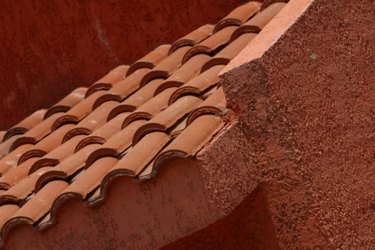
While unsealed ceramic tiles are significantly more porous than sealed ceramic tiles, both can absorb odors. This happens when the tile is subjected to a smell over a long period of time. The smell could come from any number of sources. Work to remove the source before removing the actual smell, so that the smell doesn't seep back into the ceramic tile. Use methods that are not likely to damage the tile. Always test the method on an inconspicuous area to ensure it won't change the tile's color or texture.
Mold Smells
Video of the Day
There are several causes of strong smells in ceramic tiles. This includes mold and mildew, which can develop on the tiles. When the mold spores grow, they can off-gas volatile organic compounds, which can make your tiles smell musty and dusty.
Video of the Day
Food Smells
Ceramic tiles can soak up food smells if you cook a certain type of food often and don't clean your tiles regularly. Smells that are particularly pervasive include onions, garlic and strong spices.
Sewer Smells
Bathroom ceramic tiles can begin to smell like sewage if your bathroom has the offending odor. This happens when your septic tank is full or is clogged, allowing the sewage smells to seep up through your toilet and into your bathroom. They can also happen when the U-trap in your plumbing dries out.
Removing Smells
Remove smells from ceramic tiles by using odor-absorbing solutions such as baking soda and white vinegar. Fill a spray bottle with white vinegar and spray it over the tiles. Let the white vinegar dry on the tiles. Alternatively, sprinkle baking soda over the ceramic tiles and let it sit for several hours until the smell is gone.